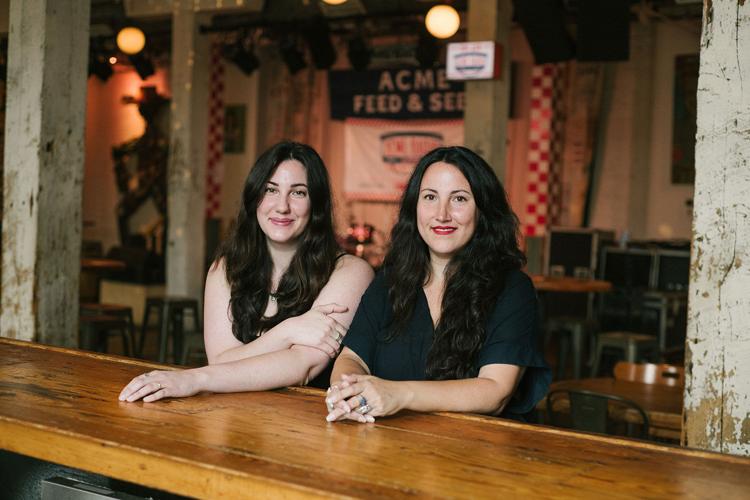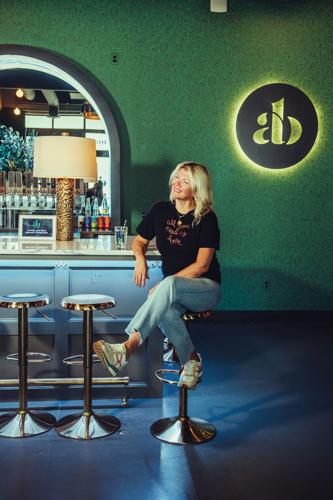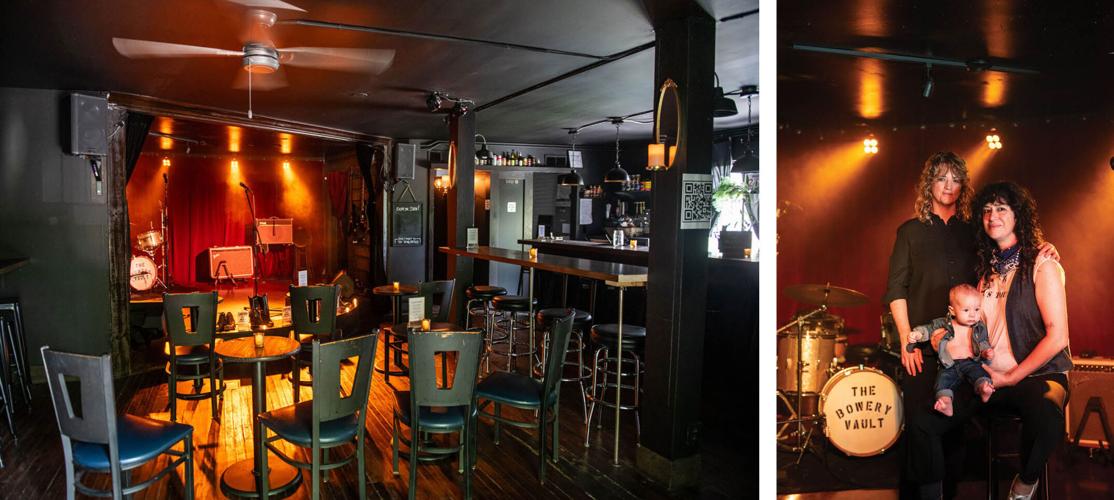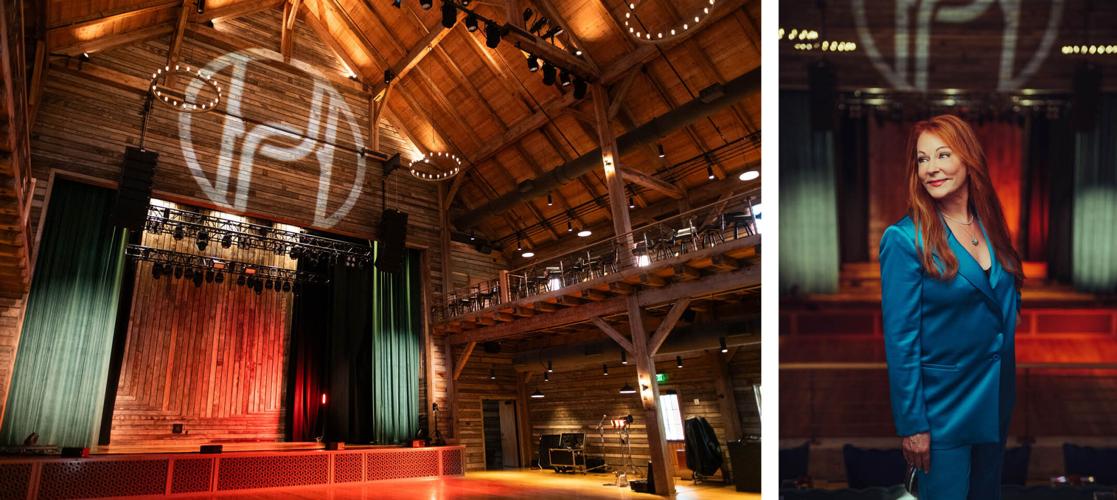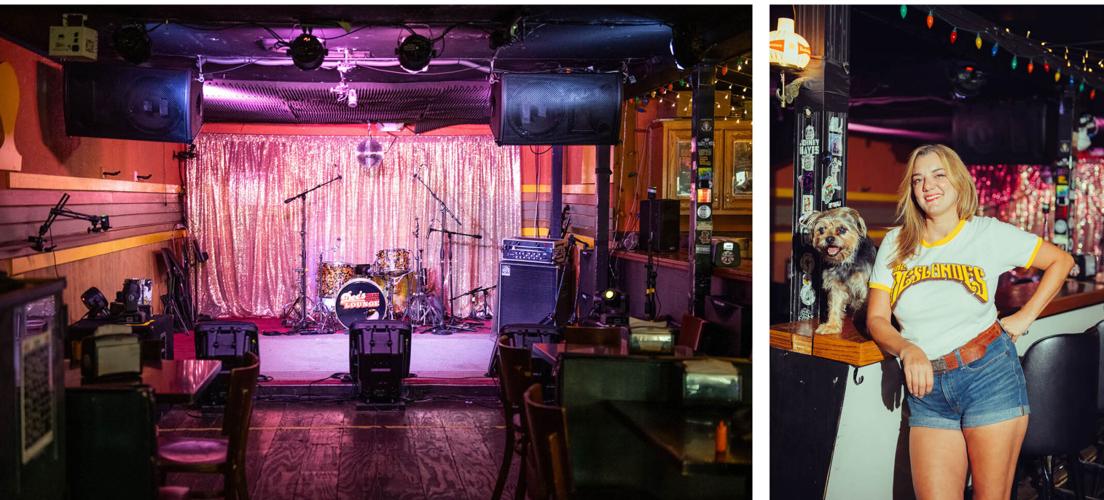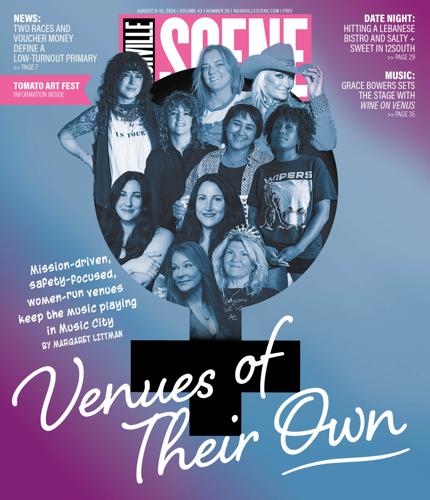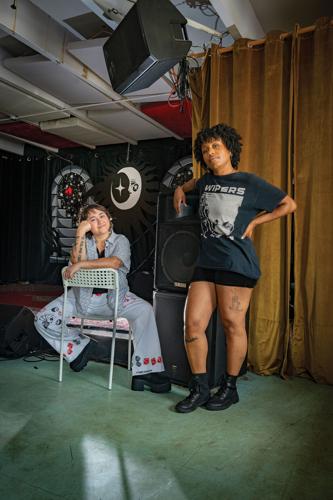When Lauren Morales started taking on more prominent roles at TomKats Hospitality, the company her father started, she found herself in male-dominated room after male-dominated room. So she looked to Layla Vartanian, owner of the eponymous Layla’s Honky Tonk, for guidance.
“Layla is my favorite person on the planet,” says Morales. “She’s been a good mentor to me for leadership roles on the Broadway Entertainment Association. She’s not afraid to speak up, even when there are big players in the room. When you’re sitting in a room with a lot of powerful men, it can sometimes feel like you’re not supposed to speak up. Watching her speak up gave me the confidence to speak up more in those rooms.”
For decades, Vartanian was one of the only women who owned an independent music venue in the city, and thus the only woman in rooms like those Morales describes. But that’s changing. After working with their father Tom Morales for years, Lauren and her sister Kendall Morales officially took over the TomKats business from him, and now they helm Acme Feed & Seed and the company’s other businesses. Women-owned music venues are increasing in number on Broadway and beyond. There are honky-tonks, concert halls, intimate bars and even a live-music karaoke joint. While they are still vastly outnumbered by male-owned venues, these venues are shaping the city’s music scene.
Women ownership of music venues is not new to Nashville. One of the most famous venues in the city was once owned by a woman, and it was under her tenure that it cemented its spot in music history. Hattie Louise “Tootsie” Bess bought a bar on Broadway that was then called Mom’s and turned it into Tootsie’s Orchid Lounge, a venue that helped launch countless careers. Bess was known for her soft side — giving down-on-their-luck musicians $5 or a beer (or both). She was also known for her hard side, famously sticking ill-behaved patrons with a sharp hat pin given to her by Charley Pride. Tootsie’s is no longer woman-owned (Bess died in 1978, and Lower Broadway magnate Steve Smith purchased it in the early 1990s), but Bess’ legacy cannot be overstated.
Today’s venues vary in size, scope, purpose, genre and ownership structure, but there are common connective threads. All of these women entrepreneurs have clarity on their core values and how those values are present in their businesses. Across the board, the women who run these venues report having low employee turnover — many working with friends and family for decades, even in an industry and an economic environment of high turnover. They are committed to uplifting other women, as partners and employees, booking more female acts with female promoters, and otherwise offering opportunities where there historically have been limits. AB Hillsboro Village’s support of teenage guitar phenom Grace Bowers is one example. Drkmttr’s everyone-is-welcome-here ethos is another.
Legendary country singer Trisha Yearwood says, “It is 100 percent important to have women-owned and women-led music venues. Women should be ruling the world. We should be given a shot. You know, guys haven’t been doing that great of a job.”
Citing the management of Camille Tambunting — COO of Strategic Hospitality, Garth Brooks and Yearwood’s partner in their Friends in Low Places Bar & Honky Tonk — Yearwood sees the role of women in creating a venue that prioritizes being a good neighbor, whether that means increasing recycling and sustainability initiatives, building extra space to manage crowds in the room design or even funding a police substation next door.
The official federal definition of a woman-owned business is a small business that is at least 51 percent owned and controlled by one or more women who are U.S. citizens. We’re defining “woman-owned” as a venue where at least one woman has an ownership stake and is involved in its operations. This excludes businesses where women are silent investors, or where female managers are in charge of operations but don’t have an ownership stake. (The previous woman ownership at The Bluebird Cafe — founded by Amy Kurland in 1982 — has been noted as a factor in Taylor Swift’s road to stardom. Today the iconic spot is owned by the Nashville Songwriters Association International and managed by a woman, Erika Wollam-Nichols.) We’ve excluded businesses that merely license a female performer’s name, such as Lainey Wilson’s Bell Bottoms Up Restaurant & Bar. And we’re defining “music venue” loosely as any venue that hosts live musicians performing as a significant part of its operations. This excludes the occasional open-mic night in a bookstore or coffee shop.

Marcie Allen Van Mol at AB Hillsboro Village
When Marcie Allen Van Mol and her husband Derek recast their former restaurant Anzie Blue as AB Hillsboro Village, the Nashville natives wanted to create a live music and event venue by locals, for locals. Van Mol, who has worked in the music industry in different capacities for decades (she once owned the late, great downtown music festival Dancin’ in the District), saw an opportunity to provide a space for performers and events that had trouble booking elsewhere. Since March 2023, AB Hillsboro Village has hosted 250 events, including a prom for a nonbinary teen who was turned away from their senior prom at Nashville Christian School. The prom was an unexpected collaborative event, and it raised AB Hillsboro Village’s profile as a place that supports progressive causes. (Disclosure: Van Mol is the niece of Bill Freeman, who owns Scene parent company FW Publishing.)
Those kinds of causes also are behind Dickerson Pike all-ages venue Drkmttr. Olive Scibelli, co-owner of Drkmttr, describes the venue as a “third place” — where musicians, other artists and kids too young to get into other venues can experiment and perform in a safe place. Drkmttr has “zero tolerance” for harassment in its space, where community building is paramount. The leftist political beliefs of those involved are “baked in our culture,” Scibelli says. That means they fly rainbow flags, and ACAB is graffitied in the bathrooms.
“Drkmttr exists because Lucy’s existed,” says Scibelli, referring to Lucy’s Record Shop. The now-legendary 1990s Nashville record shop and all-ages club morphed into a community center for people with shared values, promoting free speech and free expression.
“As more women started coming there, the level of feminist engagement increased because of the people who came there,” remembers Mary Mancini, who was one of the owners of Lucy’s. She’s also a longtime supporter of independent music and independent thought. “As the kids and the young women [who played at Lucy’s] got older and got out into the world, they took those experiences and they informed how they went out into Nashville. The bubble expanded eventually.”
Mancini and her husband Kurt Wagner of the band Lambchop learned about Drkmttr through Donnie and April Kendall, who had been partners in Lucy’s. Donnie was helping Drkmttr find a new building and asked the couple if they were interested in buying a building to make sure Drkmttr thrives. “These places are not just doing the work of adding to the incredible culture of live music,” says Mancini, who now serves on the Drkmttr board. “They’re continuing to pave the way and move forward and make space for other people to feel comfortable.”

Olive Scibelli and Kathryn Edwards at Drkmttr
Scibelli and her business partner Kathryn Edwards are applying to make Drkmttr a 501(c)(3) nonprofit. They feel that designation will help secure the 10-year-old venue’s future. It’s tough, Scibelli says, to run a venue and make “a living wage in a city that is growing.” Vartanian bought her honky-tonk in 1997 for $5,000, which she put on a credit card. Owning a business is a lot more expensive these days, with small independent venues competing against corporations with deeper pockets for rent, advertising and to pay musicians.
“Corporations should not own small music venues,” says Chris Cobb, president of the Music Venue Alliance Nashville. “It is not mission-focused on that point.”
Like many venue owners (including AB Hillsboro Village’s Van Mol and The Bowery Vault’s Emily Zimmer), Scibelli has a day job — she’s a hairstylist, and Edwards is a tour manager. “I would not tell a kid to be a venue owner,” Scibelli laughs. Even so, she says she knows the work she and other women do matters to girls and young women.
East Side all-ages venue also releasing benefit comp
“It is important [that] the representation ([which] everyone pats themselves on the backs for platforming, when it happens) is included in all aspects of the live music process for true diversity,” Edwards says via email while out on tour. “To me, it is silly to cheer on a woman being a musician and gatekeep access to roles outside of the performer. This is an important issue in my own life as a Black woman, the least-seen face within the music industry off the stage. Compare it to the question of how football leagues could be so largely Black but have such a low percentage of [Black] quarterbacks and coaches in their ranks?”
For his part, MVAN’s Cobb is optimistic that things are improving. When he owned and operated venues (including Exit/In), “it used to be all dudes backstage — maybe there was one woman on a crew. That has completely shifted for the better.” He cites the recent Greater Nashville Music Census, which found that 49 percent of respondents in the venue-presenter track were female and 55 percent of respondents in the industry track were female. Just 26 percent of those in the creative track were women, so there is room to grow on the performing and songwriting side.
The Nashville Independent Venues Study produced for Metro Nashville Planning earlier this year cited training and supporting a diverse group of next-generation independent venue owners as one priority for the city’s economic development.
Emily Zimmer and Vero Sanchez, partners in life and owners at The Bowery Vault, focus on original music in their small bar and music venue in East Nashville, nestled above The Fox Bar & Cocktail Club. The couple met when Sanchez was working at East Side bar Mickey’s.
In 2015, the couple opened a purposely intimate space that originally sold vintage clothing and coffee by day and hosted live music at night. Now the clothes have moved out, and the 49-person space has been rearranged and upgraded, with daytime available for video shoots. They have a few operating principles to which they adhere. Their stage is for original music. In the beginning, no covers were permitted at all — now they’ll let a musician play one cover to wrap up a set, but the focus remains on giving artists an opportunity to try out their own stuff. There are two shows a night, six days a week, and open-mic nights on Thursdays.
Sanchez still books all artists herself by phone, “just like CBGB booked me when I was trying to get in,” she says. The conversations allow her to get to know the artists — even as their 5-month-old son Lennox tries to knock the phone out of her hand. “There are no robots on the other end of the phone here. That’s very important for us.”
Sanchez, Cobb and many others see providing an opportunity for new artists to perform and test out their music as essential for Music City. “Otherwise we won’t have new music in 20 years,” Sanchez says.
Zimmer pays attention to detail, making sure vocalists don’t get drowned out by the band. There’s a full backline on stage. “This is a room for the song to be heard,” Zimmer says.
Like Sanchez, Zimmer and Van Mol, veteran music producer Jamie Amos saw an opportunity to offer a new musical experience. Amos is president and co-owner of Harken Hall, a new and long-awaited concert hall in Madison. The 700-seat venue is bedecked with original art, brightly upholstered furnishings and a sustainability promise. (Think bamboo toilet paper, bamboo cutlery and no plastic bottles.)
At one point, the long-delayed venue was going to be The Roots Barn. Now that Amos and her husband Patrick Kennedy have taken over, they plan to be broad in their offerings, with a performance in the works with the Nashville Opera, plus a plan for a prom-type party for older residents. Bluegrass nights on the patio are being developed as well.
At Acme Feed & Seed, the Morales sisters are also committed to upholding the values their father instilled in them and the business. At Acme, the focus is also on original music. “It is a risk,” admits Lauren Morales. “It is less risky to have a cover band playing top 40 hits, but we don’t feel like in the long game that is what is true for Nashville.”

Lauren and Kendall Morales at Acme Feed & Seed
Many female venue owners note that one of their priorities is the safety of their performers, staff and audience.
“I don’t know if women feel safe anywhere in Nashville right now,” Van Mol says. “I think it is important in today’s political and social landscape that women have a voice and a platform to spread love and inclusiveness as our rights are being attacked on a daily basis. It’s extremely important to me that when female artists come to AB, they know that they are going to be treated with respect and championed and protected.”
Todd Cassetty is the founder of Song Suffragettes, a collective of female singer-songwriters who perform Monday nights at The Listening Room. He sees a need for more venues that are aware of the challenges facing women performers — from experiencing misogyny and harassment to having to navigate unsafe late-night walks with their hands full of valuable gear. “It’s just another aspect of the business that makes it harder for women,” he says. “It is possible to make it feel welcoming and safe.”
Kira Small is trying to do just that. She owns Sid Gold’s Request Room with her husband Glen Pangle and business partner Cowboy Keith Thompson. There are three other Sid Gold’s locations in other parts of the country, but Nashville’s is the only one with female ownership. The venue, which features live piano players accompanying karaoke, is expanding to offer an ongoing “writers-around-the-piano series,” without the sing-along.
Long before Small had even considered owning a music venue, she was at Dee’s Country Cocktail Lounge, where she watched owner Amy Dee chase off a problematic patron — with a Louisville Slugger. “I wondered if I could do that,” Small says. She hasn’t had to chase anyone out with a baseball bat or stab them with a hat pin, but she has had to kick someone out who was making her staff uncomfortable. “I think I bring a softness to the bar,” she says. “And the bar has toughened me up in some ways.”
When a woman walks up to a bartender and orders an “angel shot,” the bartender knows it isn’t because she wants a drink. Angel shot is code — …
Women business owners don’t have to fight that fight (with or without a bat) alone. Several programs help train venues to recognize and reduce harassment, drugging and more, including the Sexual Assault Center’s Safe Bar initiative.
“When the Safe Bar was first getting started, we saw that women-owned establishments or bars/restaurants that had women in manager positions were much more likely to respond to us and participate in the Safe Bar program,” says Jack Ohmes, Safe Bar trainer. He cites Jackalope Brewing Co., Diskin Cider, SandBar and the now-closed Cabana Taps as early adopters. Other programs nationwide, such as Calling All Crows, work to implement bystander intervention training in music venues and at music festivals, much like Safe Bar does in bars.
Shawna Potter, a former Nashville musician (known for the bands Fair Verona and War On Women) played shows at Lucy’s when she was as young as 14. As you might expect from someone in a band called War On Women, she has seen a lot of stuff. She created the Safer Space Program and wrote the book Making Spaces Safer: A Guide to Giving Harassment the Boot, Wherever You Work, Play and Gather to go beyond the useful bystander intervention programs and provide more solutions.
Potter believes these programs are preventative training, helping venue owners and knitting-group organizers (or really anyone with a group) recognize harassment, prevent it, and address it when it happens, teaching a skill that can be honed. She cautions business owners not to assume the business doesn’t have issues with harassment just because they don’t know about it.
“If people are not telling you about it, they do not trust you to deal with it appropriately,” she says. Sometimes reported incidents of harassment increase after training because people feel more comfortable talking about it.
Amy Dee — the bat-wielding badass who inspired Small — is a majority owner of her eponymous classic country music spot in Madison. She bought an existing bar to open her spot in 2016 and immediately changed its vibe, opening at 5 p.m. instead of 11 a.m. and welcoming a different audience. Live music was already on the weekend schedule, but her ex pushed her to add performances during the week to her vision of the bar. Dee's is now known for its country sound, hosting shows during AmericanaFest and more. Dee says when her divorce is finalized she intends to make her female general manager a partner in the business.
She doesn’t have a ton of rules for patrons, but the ones she has are clear: “You have to be 21, you have to pay your tab, and you can’t be an asshole,” she says. Recently Dee hung a Pride flag outside, thinking it would only wave during Pride Month. But a new customer came in and told her he hadn’t been sure whether Dee’s was LGBTQ-friendly until he saw the flag. Now that Dee knows it makes people safe, she’ll never take it down.
Over the years, people have told her they bought their houses in Madison to be close to Dee’s, which she takes as the highest compliment. (Lauren Morales says she spends a lot of her non-Acme music-listening time and money at Dee’s.)
These female entrepreneurs are aware of the power they have in supporting and lifting other women. They’re not interested in bashing male-owned venues or playing into stereotypes about what happens at male-owned venues. But they’re not totally letting their male counterparts off the hook either.
“Any time you let a dick get involved, it gets fucked,” Dee says.
Where to Listen
Nineteen Nashville music venues owned, at least in part, by women:
AB Hillsboro Village, 2111 Belcourt Ave.: Live music and event space focused on programming for locals.
Acme Feed & Seed, 101 Broadway: Honky-tonk, event space, rooftop bar with a radio station to boot.
The Bowery Vault, 2905 Gallatin Pike: Intimate East Side venue with a focus on original music.
Carol Ann’s Nashville, 407 Murfreesboro Pike: Blues, R&B and soul food.
Dee’s Country Cocktail Lounge, 102 E. Palestine Ave., Madison: Classic country venue with a 1970s vibe.
Drkmttr, 1111 Dickerson Pike: All-ages musical hub and community gathering place.
Friends in Low Places Bar & Honky Tonk, 411 Broadway: Multistory honky-tonk with an Amazon Prime TV show about its backstory.
Harken Hall, 514 Madison Station Blvd., Madison: New 700-seat concert venue.
Layla’s Honky Tonk, 418 Broadway: Longtime woman-owned and woman-run honky-tonk.
Legends Corner, 428 Broadway: Classic honky-tonk with multiple live music stages.
Music Makers Stage, 919 Gallatin Ave.: Intimate venue connected to family-owned Delgado Guitars in East Nashville.
Miss Zeke’s Juke Joint, 3970 Bell Road, Hermitage: Blues, R&B and barbecue.
Nudie’s Honky Tonk, 409 Broadway: Live music seven days a week amid memorabilia from tailor Nudie Cohn.
Random Sample, 407 48th Ave. N.: Performance space that routinely books music and hosts art exhibits and other events.
The Second Fiddle, 420 Broadway: Classic honky-tonk with multiple live music stages.
Sid Gold’s Request Room, 3245 Gallatin Pike: Live piano accompaniment for karaoke.
Skull’s Rainbow Room, 222 Printers Alley: Live jazz seven days a week, plus burlesque to live jazz Thursday through Saturday.
The Stage on Broadway, 412 Broadway: Classic honky-tonk with multiple live music stages.
Tanya Tucker’s Tequila Cantina, 409 Broadway: Second-floor spot from the Grammy-winning “Delta Dawn” artist.

Venue owners (left to right, from top): Vero Sanchez, Amy Dee, Tanya Tucker;
Emily Zimmer, Olive Scibelli, Kathryn Edwards;
Kendall Morales, Lauren Morales;
Jamie Amos, Marcie Allen Van Mol

